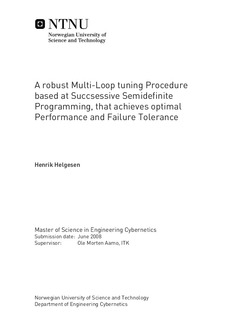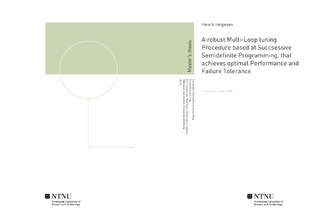| dc.contributor.advisor | Aamo, Ole Morten | nb_NO |
| dc.contributor.author | Helgesen, Henrik | nb_NO |
| dc.date.accessioned | 2014-12-19T14:01:47Z | |
| dc.date.available | 2014-12-19T14:01:47Z | |
| dc.date.created | 2010-09-03 | nb_NO |
| dc.date.issued | 2008 | nb_NO |
| dc.identifier | 347624 | nb_NO |
| dc.identifier | ntnudaim:4068 | nb_NO |
| dc.identifier.uri | http://hdl.handle.net/11250/259704 | |
| dc.description.abstract | The desired properties of a multi-loop PID tuning procedure is to find some parameters that makes the plant robust, meet some desired performance requirements and guarantee failure tolerance. A detailed literature survey of the different multi-loop PID tuning procedures are presented. Properties of the Independent design methods, Detuning methods, Sequential closing methods, Iterative or trial and error methods, Optimization methods and Relay feedback approaches are described in detail and discussed. Most of the tuning procedures result in a too conservative design without integrity. It is shown how the integrity property may be achieved with a multi-loop Hinf optimal tuning method. How to deffine and solve such a Hinf optimal problem is presented. The desired properties of the multi-loop PID tuning procedure is obtained with this method. The method aim for its object to solve a Hinf optimization problem with Linear Matrix Inequality (LMI) constraints. The optimization problem is non-convex, so a Successive Semidefnite Programming (SSP) algorithm is used to find local solutions to the problem. Several initial points must be examen to aim for a global solution. The SSP algorithm is implemented in MATLAB, and applied at a distillation column example. The implemented algorithm does not converge to a solution. Hence no simulation results that back up the theoretical work is presented. | nb_NO |
| dc.language | eng | nb_NO |
| dc.publisher | Institutt for teknisk kybernetikk | nb_NO |
| dc.subject | ntnudaim | no_NO |
| dc.subject | SIE3 teknisk kybernetikk | no_NO |
| dc.subject | Reguleringsteknikk | no_NO |
| dc.title | A robust Multi-Loop tuning Procedure based at Succsessive Semidefinite Programming, that achieves optimal Performance and Failure Tolerance | nb_NO |
| dc.type | Master thesis | nb_NO |
| dc.source.pagenumber | 93 | nb_NO |
| dc.contributor.department | Norges teknisk-naturvitenskapelige universitet, Fakultet for informasjonsteknologi, matematikk og elektroteknikk, Institutt for teknisk kybernetikk | nb_NO |

